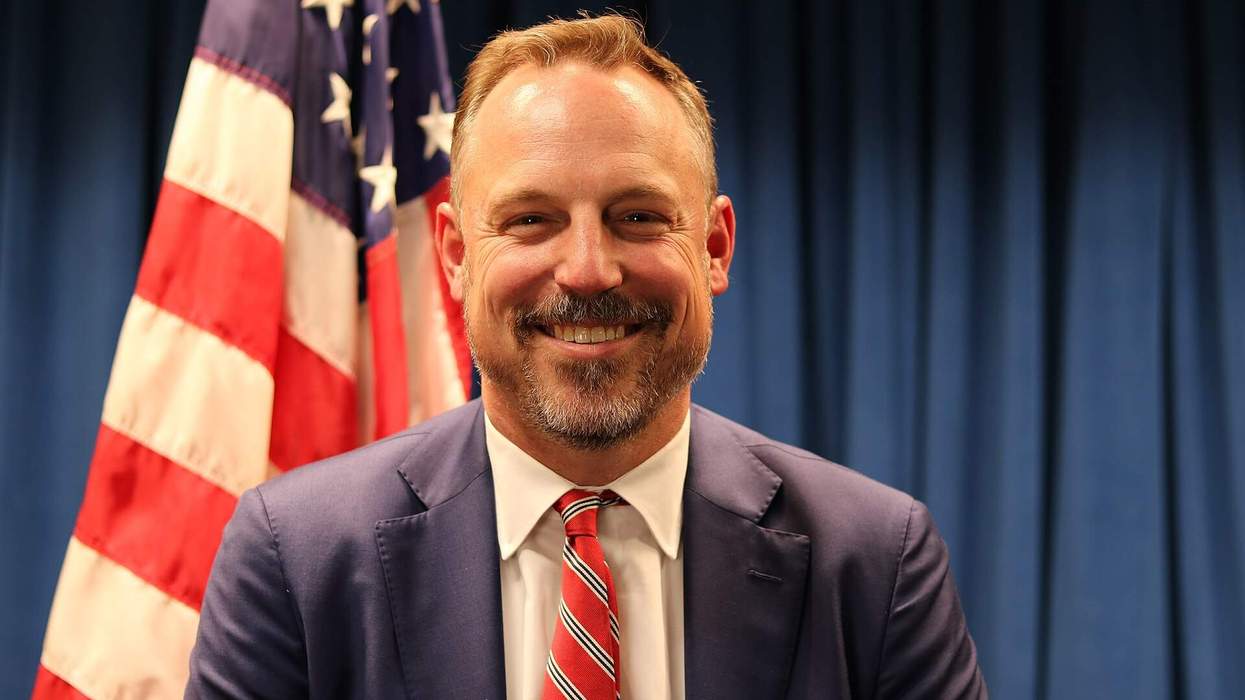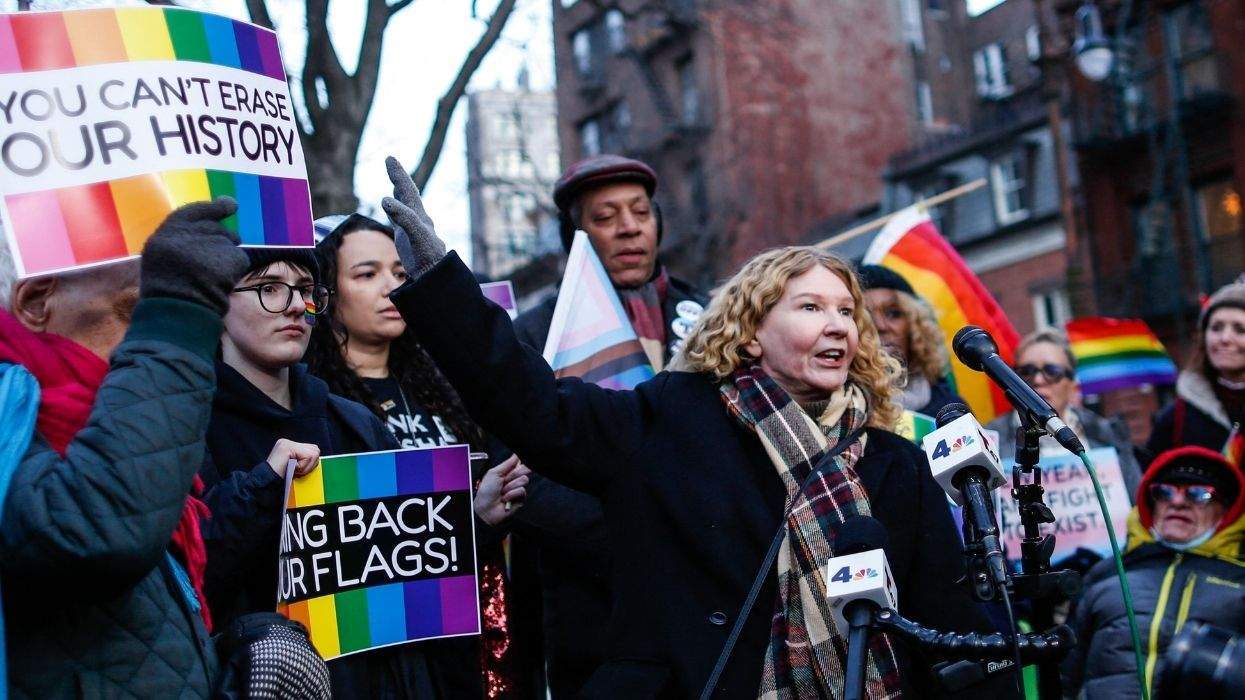The U.S. Supreme Court’s decision in United States v. Skrmetti has already sent shockwaves across the country. For legal scholar Leah Litman, it’s a ruling that crystallizes something far more dangerous than one state’s policy—it confirms the Court’s conservative majority is no longer operating as a neutral arbiter of law but as a willing participant in a partisan project targeting transgender people and other vulnerable groups.
Keep up with the latest in LGBTQ+ news and politics. Sign up for The Advocate's email newsletter.
“They don’t have to try,” to seem beyond politics, Litman told The Advocate in an interview. A constitutional law professor at the University of Michigan, Litman is also a former Supreme Court clerk who cohosts Strict Scrutiny, a Crooked Media podcast that dissects the Court’s decisions and culture. Her new book, Lawless, argues that the justices in the Court’s conservative bloc routinely dispense with precedent and consistency in favor of “legal-ish” reasoning that advances Republican priorities under the guise of constitutional interpretation.
Related: What is U.S. v. Skrmetti, the Supreme Court case that could change gender-affirming care forever?
The 6–3 ruling in Skrmetti, issued last Wednesday and authored by Chief Justice John Roberts, upheld Tennessee’s ban on gender-affirming care, including hormone therapy and puberty blockers for trans minors. The court, according to the 118-page opinion, applied rational basis review, the most deferential standard, to conclude that the law doesn’t violate the Equal Protection Clause. American Civil Liberties Union attorney Chase Strangio had argued that the court must apply heightened scrutiny, given the issue of sex discrimination he argued existed in the law. But Litman argued that the conservative majority’s logic collapses under scrutiny: the very same treatments remain legal for cisgender minors with other conditions, such as precocious puberty, but are banned when prescribed for gender dysphoria.
“The treatments that are prohibited are inextricably bound up by and not experienced by cisgender individuals but associated with what it means to be trans,” Litman said. “The idea that you can access hormones and puberty blockers for these other reasons, whether you’re trans or cis, even that logic falls apart because some of the permitted treatments are precocious puberty.”
Litman added, “In those instances, like the cis girl [experiencing precocious puberty] can get the puberty blockers and the hormones, but the trans boy can’t, and so that’s obviously discrimination on the basis of gender identity. The logic just completely falls apart.”
Related: 9 trans rights activists arrested in front of Supreme Court while protesting Skrmetti ruling
That discrepancy, she said, renders the law discriminatory on its face.
She likened the decision to the Supreme Court’s 2023 ruling in 303 Creative, which allowed a business to refuse service to same-sex couples. In both cases, Litman said, the Court accepted discriminatory treatment by reframing it as something else entirely, rooted not in animus but in supposedly neutral categories. “Since I’m a good person, and my friends are good people, then we must not be discriminating,” she said, describing the majority’s logic.
Litman argued that the justices are drawing from a well of reactionary politics disguised as jurisprudence. In Lawless, she characterizes this shift as one driven less by consistent legal reasoning than by “vibes”—an instinctive alignment with conservative grievance politics. In Skrmetti, she said, that alignment is clearest in the opinion’s sloppiness: “They’re so locked in that they’re not even engaging with counterarguments or with the factual record in any serious way.”
She warned that the ruling lays the groundwork for restricting gender-affirming care beyond minors. Roberts’ opinion, she noted, emphasized that the law did not discriminate based on gender identity—a rationale that could just as easily apply to bans on adult care. Justice Amy Coney Barrett’s concurring opinion went even further, she said, effectively inviting states to expand restrictions.
Barrett’s opinion, Litman added, was “entirely gratuitous and unnecessary.” Even if the Tennessee law did discriminate against trans people, Barrett reasoned, she would still uphold it. “That’s just inviting states to do more harm,” Litman said.
She added, “It seems to me like the ruling opens it up to states saying that adults can also not receive this care, because if, like [Justice Clarence] Thomas says, it’s based on irreversible risks and other things, I can see where they can logic their way into [allowing] banning this care for adults, too."
Related: Justice Sonia Sotomayor slams gender-affirming care ruling as 'state-sanctioned discrimination'
Barrett also rejected the argument that transgender people qualify as a suspect or quasi-suspect class under the Constitution in her concurring opinion. She cited a lack of “immutable or distinguishing characteristics,” dismissed the category as too “amorphous,” and argued that there is insufficient evidence of a history of de jure legal discrimination against transgender people to warrant heightened judicial scrutiny.
Barrett warned that granting suspect class status would force courts into overseeing “all manner of policy choices” on gender-related issues—from bathrooms and sports teams to medical protocols—intrusions she argued are best left to legislatures. Her opinion emphasized that the Equal Protection Clause does not prohibit laws based on transgender status as long as they are rationally related to a legitimate government interest.
When asked about the justices’ motivations, Litman described a combination of factors: long-standing discomfort with gender nonconformity, susceptibility to misinformation, and what she called “patriarchal commitments” that lead to moral panic over social change. She also said it’s a mistake to think new data or medical evidence would sway them. Referencing a recent Utah state-commissioned report showing gender-affirming care’s efficacy, she said bluntly: “That would not have made a lick of difference.” Republicans in the state who ordered the study chose to discard its conclusions after it failed to support the state’s ban on gender-affirming care for minors.
The justices, she said, ignore facts when they conflict with the political outcomes they seek. “It’s frustrating because those are facts… and they should have mattered. The reality is they just don’t.”
Litman spoke as the Court issued another shadow docket ruling in a separate immigration case involving Kilmar Abrego Garcia, a Maryland father deported to El Salvador under President Trump’s revived Alien Enemies Act policy. The justices stayed a lower court’s order blocking the deportation of similarly situated asylum seekers to third countries they have no relationship to. “It’s utterly terrifying,” Litman said. She criticized the Court for repeatedly indulging Trump administration policies.
She added that the Court was under no obligation to hear the government’s request—and did anyway. “The only reason why [Trump] keeps asking is because they keep saying yes.”
Litman said these patterns show the Court has become an enabler of authoritarianism. Even during her time clerking for Justice Anthony Kennedy, when challenges to the Affordable Care Act were being considered, she said she felt the institution was “on the edge of a cliff.” In that sense, she said, it has since hardened into something undeniable: the Court is now central to the “deterioration and dismantlement of liberal constitutional democracy.”
Related: In photos: U.S. v. Skrmetti protest at the Supreme Court in support of transgender youth (exclusive)
She sees Skrmetti as a pivotal moment, not because it was unexpected, but because it confirms how far the majority is willing to go without being held accountable. She worries it’s just the beginning. “What am I not worried about at this point?” she said, listing likely future targets: adult gender-affirming care, bathroom and sports access for trans students, and growing carveouts for marriage equality under religious exemptions.
Still, Litman doesn’t believe the Court will issue a direct reversal of Obergefell anytime soon. “But it just feels like they are not at all going to hold a line on the civil rights for the LGBTQ community at all,” she said. “The movement has convinced a supermajority of Americans that gays, lesbians, and bisexuals get to participate in public life. And the fight for the trans community is worth fighting and can be won.”
If Democrats regain power, she added, they should pass a federal law that prohibits discrimination based on sexual orientation and gender identity and block states from undermining marriage rights. The Democratically introduced Equality Act would usher in such protections.“They should make [Republicans] vote against it,” Litman said.
She added, “Also kind of like, fuck them, you know?”
















Charlie Kirk DID say stoning gay people was the 'perfect law' — and these other heinous quotes
These are some of his worst comments about LGBTQ+ people made by Charlie Kirk.